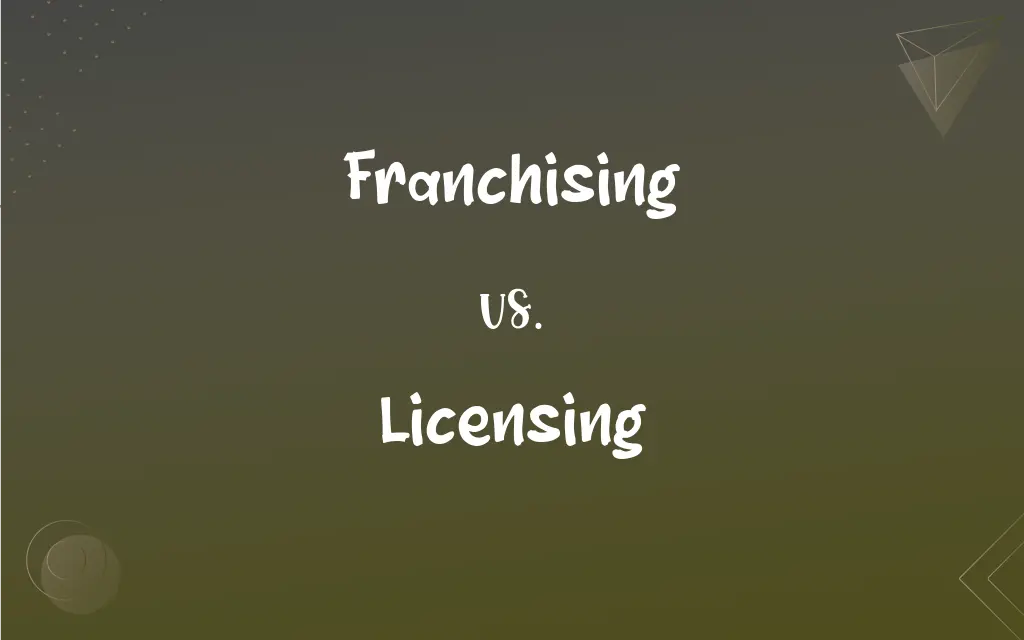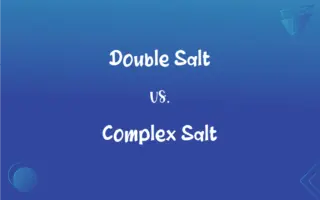Franchising vs. Licensing: What's the Difference?
Edited by Aimie Carlson || By Harlon Moss || Updated on October 23, 2023
Franchising is granting rights to use a brand and business model, while licensing is giving permission to use intellectual property or brand for specific purposes.

Key Differences
Franchising and licensing are both methods through which businesses expand their presence and profitability. Franchising involves allowing another party to operate a business under the brand and operational model of the franchisor. In this arrangement, the franchisee usually receives support, training, and resources in exchange for fees or a percentage of sales.
In contrast, licensing is a legal agreement where the licensor grants permission to the licensee to use its intellectual property, which can be anything from a trademark, patent, or design, typically for a fee or royalty. Licensing does not necessarily involve sharing the business model or providing operational support, as seen in franchising.
While franchising often encompasses a more comprehensive relationship between the franchisor and franchisee, licensing tends to be more limited in scope. For instance, a franchise might be an entire store, like a fast-food chain outlet, where the franchisee follows the franchisor's guidelines strictly. Meanwhile, licensing might allow a company to use a character's image on their products without any deeper business connection.
Another notable distinction is the control exerted. Franchisors usually maintain stricter controls to ensure brand consistency across all franchises. On the other hand, licensors might not have as much oversight over how their intellectual property is used, as long as the usage adheres to the terms of the licensing agreement.
While both franchising and licensing can be lucrative ways to grow a business, they have different risks and rewards. Franchisors benefit from rapid expansion without major capital outlay, while licensors earn without necessarily expanding operations. Licensees and franchisees, meanwhile, capitalize on established brands or technologies without starting from scratch.
ADVERTISEMENT
Comparison Chart
Definition
Granting rights to use a brand and business model
Granting permission to use intellectual property
Scope
Comprehensive business model, support, and training
Limited to specific rights on intellectual property
Control
Strict control for brand consistency
Varies, but often less strict than franchising
Typical Relationship
Long-term with ongoing support
Often short-term or project-specific
Primary Benefit to Grantor
Expansion without major capital outlay
Revenue without expanding operations
ADVERTISEMENT
Franchising and Licensing Definitions
Franchising
A method for expanding a business using another's brand and operational model.
Many global chains have grown through franchising.
Licensing
Granting permission to use intellectual property.
The company secured licensing rights for the popular cartoon.
Franchising
A partnership between franchisor and franchisee.
Through franchising, he opened three new outlets.
Licensing
Earning revenue by leasing rights to intellectual assets.
Licensing their designs brought in passive income.
Franchising
Expanding a business through third-party operators.
She considered franchising as an option for business growth.
Licensing
A contractual method to expand brand reach without direct operations.
Licensing their logo to other companies proved profitable.
Franchising
Granting rights to operate under specific brand guidelines.
Franchising allows brands to maintain consistency worldwide.
Licensing
A legal agreement on the use of a brand, patent, or design.
Through licensing, they started manufacturing superhero toys.
Franchising
A system of distributing products or services.
The coffee brand expanded its reach through franchising.
Licensing
Allowing another entity to produce or distribute using specific IP.
They made a fortune through software licensing.
Franchising
A privilege or right granted by law, especially the right to vote in the election of public officials.
Licensing
Official or legal permission to engage in a regulated activity
"He believed that the subcommittee gave him license to interrogate anyone about any possible links to communism" (Donald A. Ritchie).
FAQs
What is the primary focus of licensing?
Licensing primarily focuses on granting permission to use intellectual property.
Which method usually maintains stricter brand consistency?
Franchising usually maintains stricter brand consistency across outlets.
Is franchising typically a long-term relationship?
Yes, franchising usually involves a long-term relationship with ongoing support.
Which method is more about distributing products or services?
Franchising is more about distributing products or services under a specific brand.
Can licensing agreements vary in terms and conditions?
Yes, licensing agreements can vary based on the intellectual property and mutual terms.
Is franchising mainly about leasing rights?
Franchising is about granting rights to use a brand and business model, not just leasing rights.
Can licensing be short-term or project-specific?
Yes, licensing agreements can be short-term or tailored to specific projects.
Can franchising help maintain brand consistency worldwide?
Yes, through franchising, brands can maintain consistency worldwide.
Does franchising involve a partnership?
Yes, franchising involves a partnership between the franchisor and franchisee.
Can licensing be used to manufacture products with specific designs?
Yes, licensing can allow an entity to manufacture products using specific licensed designs.
Do all franchising models require a franchise fee?
Most franchising models require a franchise fee or a percentage of sales, but terms can vary.
Does franchising offer operational support to partners?
Yes, franchising often provides operational support, training, and resources to franchisees.
Is licensing limited to brand use?
No, licensing can encompass patents, designs, music, and more.
Can licensing be a source of passive income?
Yes, licensing intellectual property can generate passive income for licensors.
Are franchisees typically required to follow specific guidelines?
Yes, franchisees usually need to adhere to the franchisor's specific guidelines.
Do licensors expand their operations when licensing out IP?
Not necessarily; licensors can earn from licensing without expanding operations.
Is licensing always about physical products?
No, licensing can also involve software, music, or other intangible assets.
Can a company license out its logo?
Yes, a company can license its logo to other entities.
Which method involves using another's brand and business model?
Franchising involves using another's brand and business model.
Does franchising require capital outlay from the franchisor?
Franchising allows expansion without major capital outlay from the franchisor.
About Author
Written by
Harlon MossHarlon is a seasoned quality moderator and accomplished content writer for Difference Wiki. An alumnus of the prestigious University of California, he earned his degree in Computer Science. Leveraging his academic background, Harlon brings a meticulous and informed perspective to his work, ensuring content accuracy and excellence.
Edited by
Aimie CarlsonAimie Carlson, holding a master's degree in English literature, is a fervent English language enthusiast. She lends her writing talents to Difference Wiki, a prominent website that specializes in comparisons, offering readers insightful analyses that both captivate and inform.































































